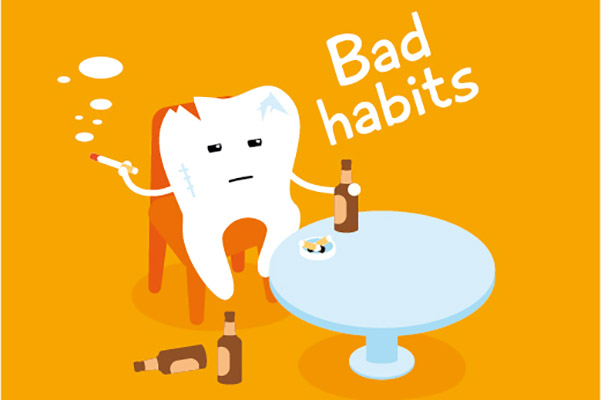 Having a firm understanding of oral hygiene basics can prevent tooth decay, gum disease, and general oral discomfort. Human beings go through life developing a range of habits that impact oral health, some of which are good and some of which are bad. Avoiding these damaging behaviors promotes strong teeth and gums that can last a lifetime.
Having a firm understanding of oral hygiene basics can prevent tooth decay, gum disease, and general oral discomfort. Human beings go through life developing a range of habits that impact oral health, some of which are good and some of which are bad. Avoiding these damaging behaviors promotes strong teeth and gums that can last a lifetime.
6 bad habits to avoid
Being proactive in good dental care habits prevents oral health problems, and correcting these tendencies can reduce potential damage to the mouth. Take note of these habits.
1. Brushing too harshly
The temptation to vigorously brush the teeth in an effort to remove bacteria and plaque should be avoided. While teeth are a durable substance, brushing too harshly will wear down the enamel on the teeth as well as irritate the gums. Should the gums begin to recede, this can lead to exposure of dentin below the gum surface. Use a soft-bristled brush and brush for two minutes more consistently to thoroughly clean the teeth.
2. Biting the fingernails
Some nervous habits are hard to kick, but given that biting on the fingernails can be incredibly damaging to the teeth, this is one that needs to go. As a part of oral hygiene basics, biting the fingernails introduces a host of bacteria and foreign germs into the mouth, but chewing on non-edible items can lead to cracking, chipping, or fracturing of the teeth.
3. Constantly eating
Though the teeth are designed to take the abuse from chewing and chomping, continually snacking throughout the day can do damage to the teeth. Drinking sugary, carbonated soft drinks or sweetened coffee can leave the teeth coated in sugar for the day. However, constantly eating carbohydrate-filled foods or munching on chips acts as fuel for any oral bacteria living in the mouth. This can create a strong, damaging layer of plaque and tartar that leads to premature tooth decay.
4. Grinding or clenching
Many people develop the habit of bruxism, which is grinding the teeth or clenching the jaw for extended periods of time. It can occur throughout the night or while an individual is awake, and it has been seen in individuals dealing with stress. These bad habits wear down the enamel on the teeth and increase the vulnerability of tooth decay. The habit can create problems with jaw pain, chipped teeth, and headaches.
5. Tobacco use
Using tobacco is deemed hazardous to one’s overall health, but it also has a direct impact on good oral health. Tobacco can cause staining on the teeth and mar the appearance. Further concerns come from the potential inflammation of the salivary glands and reduced saliva production. Smoking can also lead to oral concern, loss of bone density in the jaw, gum disease, and bad breath.
6. Poor chewing decisions
Teeth should not be used as tools, whether tearing a bag of chips open or holding onto items. Teeth should not be used to chew on ice, popcorn kernels, or other hard materials.
Conclusion
Know these oral hygiene basics to preserve the look and function of the teeth. Bad habits can lead to discomfort and serious damage.
Request an appointment or call Family Choice Dental at 505-634-5657 for an appointment in our Albuquerque office.
Related Posts
There are several options available to patients after losing a tooth. One of the more popular options -- and perhaps the longest-lasting solution – is implant dentistry. This involves the placement of one or more dental implants, followed by the attachment of abutments and a crown, bridge, or denture.Depending on the number of teeth that…
Implant dentistry offers a tooth replacement solution that looks and feels natural. This is due in large part to the implant, which fuses together with the jawbone and serves as the support and root of the replacement tooth. This review discusses the unique benefits of choosing implant dentistry to replace a missing tooth.The most notable…
Implant dentistry includes the entire treatment implant process, from the consultation visit to providing aftercare and educational services to ensure the implants remain in good condition. The following review discusses how you can get the most out of your dental implants through good aftercare practices.You can care for your dental implant restoration by implementing a…
